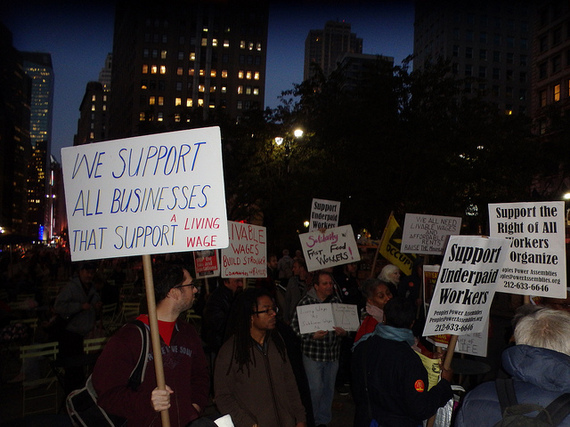Earlier this month, while Republicans in Congress were torpedoing efforts to raise the federal minimum wage, leaders in Seattle took a big step in the opposite direction - announcing a plan that would require employers to pay workers in the city at least $15 per hour.
Seattle isn't alone. This year, at least 34 state legislatures are considering bills to increase the minimum wage, which is great news. But a lot depends on how robust the proposed increases in each state are; we can't be content with minor increases that barely make up for the languishing national minimum. So that workers can have a shot at paying for life's basic necessities and pulling themselves out of poverty, more city and state governments should consider following Seattle's lead.
As millions of low-wage workers know, the current federal minimum is woefully insufficient. Until a few decades ago, the minimum wage could keep a family of two above the poverty line. At $15,080 annually for a full-time worker making $7.25 per hour, that's not the case today. Its real value is also lower now than it was in 1950.
Things are also precarious for most tipped workers, whose minimum wage is a paltry $2.13 per hour -- an amount that hasn't changed in more than twenty years. Subject to wide swings in how much they earn, tipped workers are more than twice as likely to face poverty than other workers. The proposal to boost the federal minimum wage to $10.10 supported by President Obama and Democrats in Congress would raise their minimum to a more reasonable 70% of the overall minimum wage. In many states and cities, though, these workers -- the majority of whom are women -- are specifically exempted from the wage increases. We need to ensure these workers aren't left behind as standards rise for the rest of the workforce.
It is critical that states and cities continue to step up because we cannot expect reforms at the federal level anytime soon. President Obama and other Democrats deserve credit for trying, but hoping for action from Republicans who are committed to thwarting positive change would be foolish. Indeed, Republicans in Congress refused to seriously consider the $10.10 proposal, which would benefit more than 28 million workers. Those elected officials are simply not listening to their constituents; most registered Republicans and small business owners backed that idea. A recent poll even found support for raising the minimum wage among a key Republican Party constituency: millionaires.
Predictably, this move toward setting a new, higher minimum wage standard has raised the ire of conservatives fearful of the growing nationwide movement to improve the pay and conditions for low-wage workers. You've heard their hollow arguments against raising the minimum wage before: It will kill jobs and harm the economy and businesses. These arguments aren't new; in 1959, Eleanor Roosevelt said she'd already been hearing those old chestnuts for 50 years.
But that tired rhetoric has been proven wrong time and again. Researchers have found the minimum wage has no noticeable effect on employment. And on the wage front, the opposite of conservatives' arguments is true: Raising wages will clearly help our economy, which barely grew in the first quarter of 2014, and remains weak overall. Putting more money in workers' pockets is good for everyone because it boosts consumer spending, which grows our economy. Without this boost, our economy will never recover from the hit it took from the financial crisis.
The growth in inequality in the past few decades and the tepid growth our economy is experiencing are perhaps the most serious challenges we face as a nation. Raising the minimum wage won't solve these problems overnight, but making sure workers earn enough to get by is critical to turning the tide and strengthening our economy. And it's something we should advance in our communities today.
Photo credit: Otto Yamamoto
